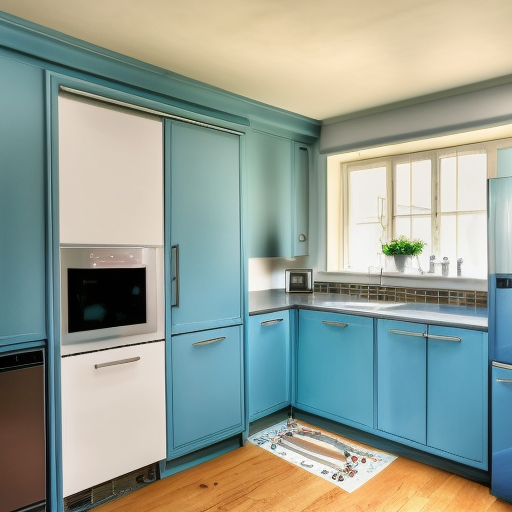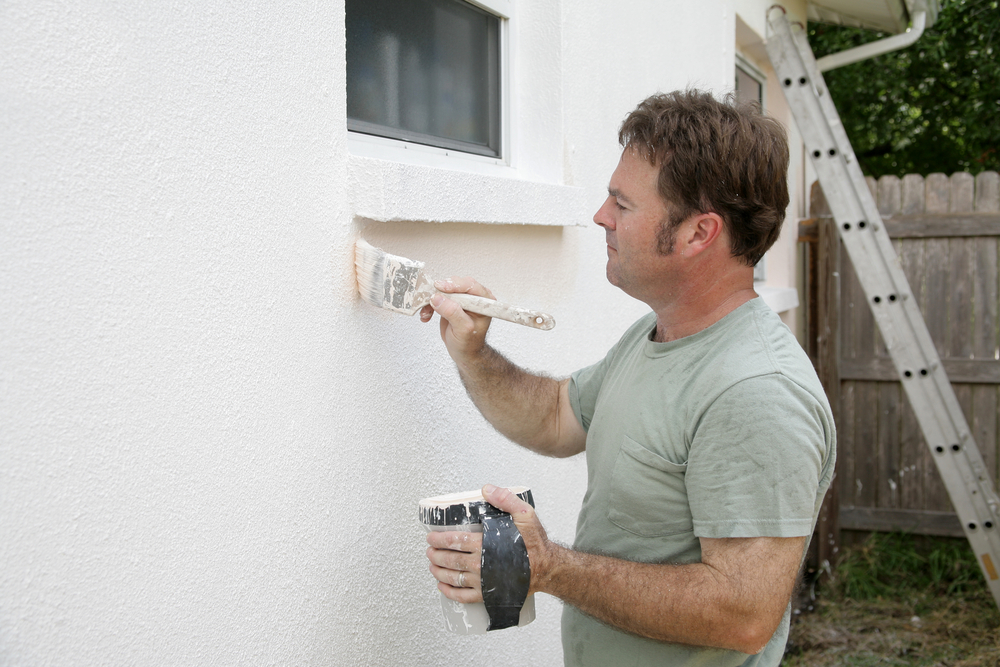Last Updated on January 27, 2023
Masonry paint is a special type of exterior and interior paint that can be used for many purposes. But what is masonry paint used for? In this blog post, we’ll explore all you need to know about it. From understanding its basics to choosing the right kind, you will have everything you need to make sure your next project looks amazing! So get ready to learn more about masonry paint used for – let’s dive in!
Table of Contents:
- Masonry Paint Basics
- Exterior Masonry Paint Uses
- Interior Masonry Paint Uses
- Choosing the Right Masonry Paint
- FAQs in Relation to What is Masonry Paint Used for
- Conclusion
Masonry Paint Basics
Masonry paint is a type of paint that is specifically designed to protect and decorate masonry surfaces. It’s composed of acrylic resins, which are blended with pigments and other additives to create a durable finish. Masonry paints come in both interior and exterior varieties, each designed for different applications.

Exterior Masonry Paint Uses: Exterior masonry paints are typically used on the outside walls of homes or buildings. They provide protection from weathering elements such as rain, snow, wind, UV rays, and more. These types of paints also help prevent mould growth by providing an impermeable barrier between the surface and moisture-laden air. Additionally, they can be tinted to match any colour scheme you desire for your home’s exterior look.
Interior Masonry Paint Uses: Interior masonry paints can be used on brick fireplaces or chimneys inside your home, as well as on concrete floors or walls in basements or garages. This type of paint provides a decorative finish while protecting against dirt buildup and staining caused by everyday use. It also helps reduce dust accumulation since it creates an impermeable layer over the surface it covers—making it easier to clean up messes without having them penetrate into the material beneath it.
Masonry paint is a great way to protect and enhance your home or garden, but there are many different uses for it. Next, we’ll look at the specific uses of exterior masonry paint.
Exterior Masonry Paint Uses
Masonry paint is a great way to protect and beautify the exterior of your home. Whether you’re looking to spruce up a tired-looking fence or brighten up an old shed, masonry paint can help give it a new lease of life.
One of the most common uses for masonry paint is on walls. It’s perfect for giving them an extra layer of protection against the elements, as well as adding colour and texture to make them look more attractive. Masonry paints are also ideal for brickwork and stonework, providing an effective barrier against water damage while still allowing these materials to breathe naturally.
Fences are another popular target for masonry paints – they’re often exposed to harsh weather conditions, which can cause them to become discoloured over time. Applying a coat of masonry paint will not only help keep your fence looking good but will also provide some additional protection from the elements too.
Sheds are another area where masonry paints come into their own – they offer excellent coverage and durability that makes them perfect for protecting wooden structures from rot or decay caused by dampness or mould growth. They can also be used on other outdoor furniture, such as garden tables and chairs, helping extend their lifespan significantly in comparison with regular wood treatments alone.
Finally, if you have any concrete surfaces around your property, then applying a coat of masonry paint is highly recommended. It helps prevent cracks from forming due to frost damage while at the same time making these areas look much more aesthetically pleasing than plain grey concrete.
Exterior masonry paint can be used to protect and decorate a variety of surfaces, from brickwork to concrete. Now let’s look at the different uses for interior masonry paint.
Interior Masonry Paint Uses
Masonry paint is a versatile product that can be used to enhance the look of any interior space. Whether you’re looking to give your kitchen an upgrade or add some character to your living room, masonry paint can help you achieve the desired effect.
Bathrooms: Masonry paint is perfect for bathrooms because it resists moisture and helps protect against mould and mildew growth. It also provides a durable finish that won’t easily chip or scratch off, making it ideal for high-traffic areas like bathrooms. For added flair, consider using two different colours of masonry paint in contrasting shades to create an eye-catching design on walls or floors.

Kitchens: In kitchens, masonry paint can be used as a decorative element by adding colour and texture to cabinets and countertops. It’s also great for protecting surfaces from grease splatters and other messes while providing a stylish finish at the same time. If you’re feeling adventurous, try creating unique patterns with multiple colours of masonry paint on your kitchen walls or backsplash.
Living Rooms: Masonry paints are available in many different finishes, so they can be used to match any existing décor style in living rooms. From matte finishes that provide a subtle contrast to glossy finishes that make bold statements, there’s something for everyone when it comes to choosing the right type of masonry paint for this area of your home. You could even use stencils with various colours of masonry paints if you want something truly unique.
Overall, interior spaces such as bathrooms, kitchens and living rooms all benefit from having some kind of protection against dirt and grime. With their versatility and durability, masonry paints are the perfect choice when giving these spaces an upgrade.
Interior masonry paint can be used for a variety of projects, from updating the look of your home to protecting it from the elements. Now that you know what interior masonry paint can do, let’s explore how to choose the right one for your project.
Choosing the Right Masonry Paint
Whether you’re looking for an outdoor wall finish that will last through all weather conditions or a special effect coating for interior walls, choosing the right masonry paint can make all the difference.
Consider Your Surface Type
The type of surface you are painting will determine which type of masonry paint is best suited to your project. If you are working with brickwork, then acrylic-based masonry paint should be used as it provides good adhesion and durability against water penetration. For concrete surfaces, use a latex-based masonry paint, as this will provide excellent coverage and protection from moisture damage.
Weather Conditions Matter
When selecting your masonry paint, consider what kind of weather conditions it needs to withstand over time. If you live in an area where there is high humidity or frequent rain showers, then opt for a waterproofing product such as silicone-based paints, which offer superior protection against water ingress and dampness issues. On the other hand, if you live in an arid climate, then choose breathable paints that allow moisture vapour transmission so that any trapped moisture can escape without causing damage to your walls over time.
Choose The Right Finish
FAQs in Relation to What is Masonry Paint Used for
What is the difference between masonry paint and regular paint?
Masonry paint is a specialized type of paint designed for use on brick, stone, concrete and other masonry surfaces. It has a higher level of water resistance than regular paint and can also provide better protection against weathering. Masonry paints are usually thicker in consistency and contain special binders that help them adhere to the surface more effectively. They may also contain additives such as fungicides or waterproofing agents, which make them ideal for exterior applications. Regular paints are typically used on interior walls, ceilings, woodwork and metal surfaces but cannot offer the same level of durability or protection from the elements as masonry paints do.
Where do you use masonry paint?
It is designed to provide a durable finish that resists fading from UV rays and other environmental elements. Masonry paint can be applied directly onto the surface or over an existing coat of primer or sealer. It should be applied in two thin coats with at least 24 hours of drying time between each coat for best results. When applying masonry paint, it’s important to use the correct tools, such as brushes, rollers or sprayers, depending on the size of the area being painted. Additionally, you should always wear protective clothing when painting masonry surfaces due to potential exposure to hazardous materials like lead-based paints.
Is masonry paint waterproof?
Yes, masonry paint is waterproof. It is designed to protect surfaces from the elements and keep them looking good for longer. The paint forms a protective layer that prevents water from penetrating the surface, which helps prevent damage caused by moisture. Masonry paints are available in a variety of finishes, so you can choose one that best suits your needs and requirements.
Conclusion
It can be used to protect and enhance the look of your property, as well as increase its value. With so many options available, you should have no trouble finding the right masonry paint used for your needs. Just make sure to do your research and pick a product that will give you the best results!
Paul is the type of person who never met a problem he couldn’t fix. He can always be found tinkering with something in his house, even if it isn’t broken! His tips and tricks are often shared on our site. He’s the one you call when something breaks because he has been known to improvise fixes for everything from leaky faucets to malfunctioning dryers.

